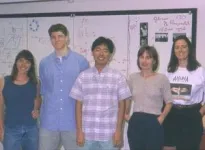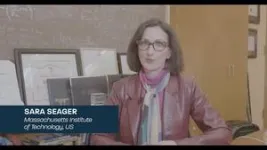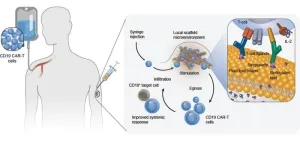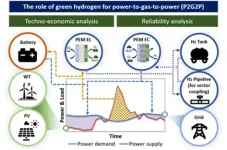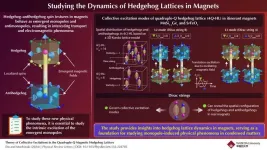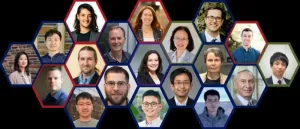(Press-News.org) The Norwegian Academy of Science and Letters today announced the 2024 Kavli Prize Laureates in the fields of astrophysics, nanoscience, and neuroscience. The 2024 Kavli Prize in Neuroscience honors McGovern Investigator and MIT neuroscientist Nancy Kanwisher, UC Berkeley neurobiologist Doris Tsao, and Rockefeller University neuroscientist Winrich Freiwald for their discovery of a highly localized and specialized system for representation of faces in human and non-human primate neocortex. The neuroscience laureates will share $1 million USD.
"Kanwisher, Freiwald, and Tsao together discovered a localized and specialized neocortical system for face recognition,” says Kristine Walhovd, Chair of the Kavli Neuroscience Committee. “Their outstanding research will ultimately further our understanding of recognition not only of faces, but objects and scenes.”
Overcoming failure
As a graduate student at MIT in the early days of functional brain imaging, Kanwisher was fascinated by the potential of the emerging technology to answer a suite of questions about the human mind. But a lack of brain imaging resources and a series of failed experiments led Kanwisher consider leaving the field for good. She credits her advisor, MIT Professor of Psychology Molly Potter, for supporting her through this challenging time and for teaching her how to make powerful inferences about the inner workings of the mind from behavioral data alone.
After receiving her PhD from MIT, Kanwisher spent a year studying nuclear strategy with a MacArthur Foundation Fellowship in Peace and International Security, but eventually returned to science by accepting a faculty position at Harvard University where she could use the latest brain imaging technology to pursue the scientific questions that had always fascinated her.
Zeroing in on faces
Recognizing faces is important for social interaction in many animals. Previous work in human psychology and animal research had suggested the existence of a functionally specialized system for face recognition, but this system had not clearly been identified with brain imaging technology. It is here that Kanwisher saw her opportunity.
Using a new method at the time, called functional magnetic resonance imaging or fMRI, Kanwisher’s team scanned people while they looked at faces and while they looked at objects, and searched for brain regions that responded more to one than the other. They found a small patch of neocortex, now called the fusiform face area (FFA), that is dedicated specifically to the task of face recognition. She found individual differences in the location of this area and devised an analysis technique to effectively localize specialized functional regions in the brain. This technique is now widely used and applied to domains beyond the face recognition system. Notably, Kanwisher's first FFA paper was co-authored with Josh McDermott, who was an undergrad at Harvard University at the time, and is now an associate investigator at the McGovern Institute and holds a faculty position alongside Kanwisher in MIT's Department of Brain and Cognitive Sciences.
From humans to monkeys
Inspired by Kanwisher´s findings, Winrich Freiwald and Doris Tsao together used fMRI to localize similar face patches in macaque monkeys. They mapped out six distinct brain regions, known as the face patch system, including these regions’ functional specialization and how they are connected. By recording the activity of individual brain cells, they revealed how cells in some face patches specialize in faces with particular views.
Tsao proceeded to identify how the face patches work together to identify a face, through a specific code that enables single cells to identify faces by assembling information of facial features. For example, some cells respond to the presence of hair, others to the distance between the eyes. Freiwald uncovered that a separate brain region, called the temporal pole, accelerates our recognition of familiar faces, and that some cells are selectively responsive to familiar faces.
“It was a special thrill for me when Doris and Winrich found face patches in monkeys using fMRI,” says Kanwisher, whose lab at MIT’s McGovern Institute has gone on to uncover many other regions of the human brain that engage in specific aspects of perception and cognition. “They are scientific heroes to me, and it is a thrill to receive the Kavli Prize in neuroscience jointly with them.”
“Nancy and her students have identified neocortical subregions that differentially engage in the perception of faces, places, music and even what others think,” says McGovern Institute Director Robert Desimone. “We are delighted that her groundbreaking work into the functional organization of the human brain is being honored this year with the Kavli Prize.”
Together, the laureates, with their work on neocortical specialization for face recognition, have provided basic principles of neural organization which will further our understanding of how we perceive the world around us.
About the Kavli Prize
The Kavli Prize is a partnership among The Norwegian Academy of Science and Letters, The Norwegian Ministry of Education and Research, and The Kavli Foundation (USA). The Kavli Prize honors scientists for breakthroughs in astrophysics, nanoscience and neuroscience that transform our understanding of the big, the small and the complex. Three one-million-dollar prizes are awarded every other year in each of the three fields. The Norwegian Academy of Science and Letters selects the laureates based on recommendations from three independent prize committees whose members are nominated by The Chinese Academy of Sciences, The French Academy of Sciences, The Max Planck Society of Germany, The U.S. National Academy of Sciences, and The Royal Society, UK.
END
Nancy Kanwisher shares 2024 Kavli Prize in Neuroscience
McGovern Institute neuroscientist is honored for her discovery of a specialized system within the brain to recognize faces.
2024-06-12
ELSE PRESS RELEASES FROM THIS DATE:
2024 Kavli Prize Laureates named in astrophysics, nanoscience and neuroscience
2024-06-12
Eight scientists from three countries are honored for their research that has broadened our understanding of the big, the small and the complex.
June 12, 2024 (Oslo, Norway) — The Norwegian Academy of Science and Letters today announced the 2024 Kavli Prize Laureates in the fields of astrophysics, nanoscience and neuroscience. Eight scientists from three countries are honored for their research that has broadened our understanding of the big, the small and the complex. The laureates in each field will share $1 million USD.
The ...
Nasal microbiota is potential diagnostic biomarker for sepsis
2024-06-12
Washington, D.C—The nasal microbiota of intensive care unit (ICU) patients effectively distinguishes sepsis from non-septic cases and outperforms analyzing the gut microbiota to predict sepsis, according to a new study published in Microbiology Spectrum, a journal of the American Society for Microbiology.
“These findings have implications for the development of diagnostic strategies and advancements in critical care medicine,” said corresponding study author Xiaolong He, M.D., Ph.D., a professor at the Microbiome Medicine Center, Department of Laboratory Medicine, ...
Boosting CAR-T cell therapies from under the skin
2024-06-12
T-cell stimulating biomaterial that slowly biodegrades under the skin stimulates CAR-T cells in the body to improve therapeutic efficacy in an aggressive mouse tumor model.
By Benjamin Boettner
(BOSTON) — CAR-T cell therapies are transforming the treatment of previously incurable blood cancers. Six approved CAR-T products have been administered to more than 20,000 people, and more than 500 clinical trials are underway. However, according to a recent study out of the Massachusetts General Hospital, ...
Overcoming the volatility of renewable energy, green hydrogen is 'the best'
2024-06-12
A research team in Korea Institute of Energy Research has successfully demonstrated the effectiveness of a green hydrogen system used to supplement the volatility of renewable energy.
*Green hydrogen: Hydrogen obtained by electrolysis of water, in which electrical energy derived from renewable sources such as solar and wind power is applied to water to produce hydrogen and oxygen. This production method is an environmentally friendly hydrogen production process with no carbon dioxide emissions.
Dr. Joungho Park and his research team at the Energy ...
Redefining "hormonal": The new nonprofit empowering women
2024-06-12
Hormonally.org is a digital platform that provides free-to-access, evidence-based resources designed to empower women (and all those affected by hormones) to seek the appropriate care, treatment, and support they deserve. Hormonally’s mission is to make access to information on women’s hormonal health a more equitable experience for all.
The new nonprofit organization offers accessible information and a safe place to discuss and discover everything from the first period to post-menopause. Hormonally ...
MD Anderson and Sibylla Biotech announce strategic collaboration to discover and develop small-molecule protein degraders
2024-06-12
HOUSTON and MILAN ― The University of Texas MD Anderson Cancer Center and Sibylla Biotech today announced a strategic collaboration agreement to discover and develop novel small-molecule cancer therapies known as folding interfering degraders (FIDs), which disrupt the proper folding of target proteins and lead to their degradation.
Under the agreement, Sibylla and MD Anderson will jointly conduct discovery and development work from target identification through drug candidate nomination on selected proteins, with the potential ...
Uncovering the nature of emergent magnetic monopoles
2024-06-12
Magnetic monopoles are elementary particles with isolated magnetic charges in three dimensions. In other words, they behave as isolated north or south poles of a magnet. Magnetic monopoles have attracted continuous research interest since physicist Paul Dirac’s first proposal in 1931. However, real magnetic monopoles have not yet been observed and their existence remains an open question. On the other hand, scientists have discovered quasi-particles that mathematically behave as magnetic monopoles in condensed ...
New study shows long-term effectiveness of gastric bypass in treating type 2 diabetes and obesity
2024-06-12
SAN DIEGO – June 12, 2024 -- Roux-en-Y gastric bypass, a type of weight-loss surgery, kept type 2 diabetes in remission for up to 15 years and most of the weight off for up to 20 years in one of the largest long-term studies of patients undergoing the procedure. The study* was presented today at the American Society for Metabolic and Bariatric Surgery (ASMBS) 2024 Annual Scientific Meeting.
Researchers from Geisinger Medical Center in Danville, PA analyzed diabetes remission rates and weight-loss outcomes of 2,045 patients who had a gastric bypass at their center between 2001 and 2008 ...
Hokkaido University scientist recognized in award from the Royal Society of Chemistry
2024-06-12
The NSF Center for Molecularly Optimized Networks team, of which Professor Jian Ping Gong of the Faculty of Advanced Life Science and the Institute for Chemical Reaction Design and Discovery (WPI-ICReDD) at Hokkaido University is a member, has won a Horizon Prize from the Royal Society of Chemistry.
The Royal Society of Chemistry (RSC)’s Prizes portfolio is one of the oldest and most prestigious in the world, recognizing achievements by individuals, teams and organizations in advancing the chemical sciences. They reward those undertaking excellent work in the chemical sciences from across the world. The NSF Center for Molecularly Optimized Networks team, including Professor ...
Cocaine trafficking threatens critical bird habitats
2024-06-12
ITHACA, N.Y. – In addition to its human consequences, cocaine trafficking harms the environment and threatens habitats important to dozens of species of migratory birds, according to a new study.
Two-thirds of the areas that are most important to forest birds – including 67 species of migratory birds that breed in the U.S. and Canada and overwinter in Central America – are at increased risk from cocaine trafficking activities, according to the study, “Intersection of Narco-Trafficking, Enforcement and Bird Conservation ...
LAST 30 PRESS RELEASES:
Yale study challenges notion that aging means decline, finds many older adults improve over time
Korean researchers enable early detection of brain disorders with a single drop of saliva!
Swipe right, but safer
Duke-NUS scientists identify more effective way to detect poultry viruses in live markets
Low-intensity treadmill exercise preconditioning mitigates post-stroke injury in mouse models
How moss helped solve a grave-robbing mystery
How much sleep do teens get? Six-seven hours.
Patients regain weight rapidly after stopping weight loss drugs – but still keep off a quarter of weight lost
GLP-1 diabetes drugs linked to reduced risk of addiction and substance-related death
Councils face industry legal threats for campaigns warning against wood burning stoves
GLP-1 medications get at the heart of addiction: study
Global trauma study highlights shared learning as interest in whole blood resurges
Almost a third of Gen Z men agree a wife should obey her husband
Trapping light on thermal photodetectors shatters speed records
New review highlights the future of tubular solid oxide fuel cells for clean energy systems
Pig farm ammonia pollution may indirectly accelerate climate warming, new study finds
Modified biochar helps compost retain nitrogen and build richer soil organic matter
First gene regulation clinical trials for epilepsy show promising results
Life-changing drug identified for children with rare epilepsy
Husker researchers collaborate to explore fear of spiders
Mayo Clinic researchers discover hidden brain map that may improve epilepsy care
NYCST announces Round 2 Awards for space technology projects
How the Dobbs decision and abortion restrictions changed where medical students apply to residency programs
Microwave frying can help lower oil content for healthier French fries
In MS, wearable sensors may help identify people at risk of worsening disability
Study: Football associated with nearly one in five brain injuries in youth sports
Machine-learning immune-system analysis study may hold clues to personalized medicine
A promising potential therapeutic strategy for Rett syndrome
How time changes impact public sentiment in the U.S.
Analysis of charred food in pot reveals that prehistoric Europeans had surprisingly complex cuisines
[Press-News.org] Nancy Kanwisher shares 2024 Kavli Prize in NeuroscienceMcGovern Institute neuroscientist is honored for her discovery of a specialized system within the brain to recognize faces.

